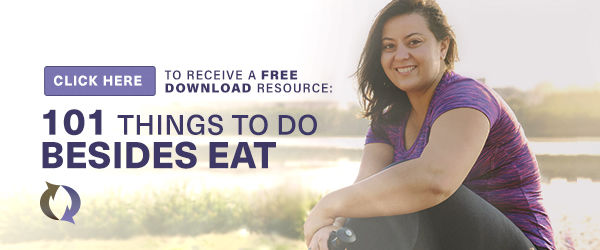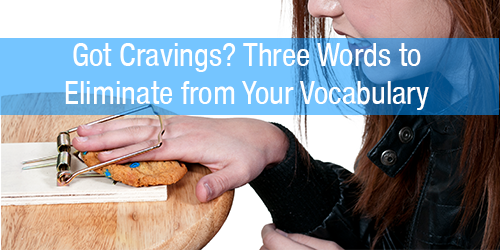Do you crave foods you “shouldn’t” eat? Are you constantly fighting cravings for “bad” foods? Ironically, believing you shouldn’t eat or can’t have a particular food, or thinking a food is bad, increases your cravings for that food and drives the eat-repent-repeat cycle! So, if you’ve got cravings, there are three words to eliminate from your vocabulary: I can’t have…
Three words that make you crave food: I can’t have…
 If you were the author of four books with the title “Eat What You Love, Love What You Eat,” you too would bristle every time you heard the phrase, “I can’t have _____________ (fill in food or ingredient).” And these days, people say that often!
If you were the author of four books with the title “Eat What You Love, Love What You Eat,” you too would bristle every time you heard the phrase, “I can’t have _____________ (fill in food or ingredient).” And these days, people say that often!
Words are very powerful! They drive your beliefs, feelings, and behaviors.
The three words, “I can’t have,” (and the related words, “I’m not allowed to have”) have the power to backfire by triggering deprivation, cravings, rebellion, and the eat-repent-repeat cycle.
When you say “I can’t have,” it strips away your choice and your power. Unless you have a serious food allergy, you are an adult, so you can have anything you want.
Restrictive food rules trigger cravings
More often than not, “I can’t have” is based on a rule from whatever diet you’re following. Sometimes you’re not even on a a diet anymore, but you remember the list of “Bad Foods” from past diets. You subconsciously tell yourself you can’t have those foods, even while you are eating them. The result is the same.
When you say, “I can’t have bread,” or “I can’t eat sugar,” your brain focuses on bread and sugar! With your brain on high alert, you’ll begin to notice bread and sugar everywhere! Since you’re “not allowed to have it,” seeing those foods triggers feelings of deprivation and cravings that eventually lead to overeating and guilt.
On the other hand, the Mindful Eating Cycle is a powerful decision making tool that eliminates the need for all those rules. Instead of focusing on what you can’t have, you use a few new and surprisingly simple strategies to create critical shifts in your relationship with food.
You can eat what you love fearlessly! And when deprivation and guilt are no longer a factor, your cravings will diminish.
I crave foods that make me feel uncomfortable
Perhaps you experience unpleasant consequences or side effects when you eat certain foods.
First, it is helpful that you recognize that connection. In fact, one of the many benefits of mindful eating is awareness of the connections between what (or how much) you eat and how you feel (not to mention, how you feel and what you want to eat!)
You are in charge, so if you recognize that a particular food leaves you feeling uncomfortable, in the future you may decide to skip that food or eat less often or in smaller quantities.
Since you have the power to choose for yourself, instead of saying “I can’t have _____,” use phrases like:
- I choose not eat _________.
- I’d rather have __________.
- I prefer __________
- Or simply, “No thank you,”
These phrases affirm that you’re in charge of the decisions you make.
But I have diabetes and I crave foods I shouldn’t eat!
There it is again! Even with a medical condition, saying “I can’t have” only increases feelings of deprivation and cravings. And while we’re talking about the power of words, let’s eliminate “should” and “shouldn’t” too!
And while some individuals, such as those who have diabetes or those who’ve had bariatric surgery, might feel better when they limit or eliminate certain foods, it’s important to make choices instead of trying to follow rules. The key to making sustainable changes is to apply mindful eating strategies without turning those limitations into a restrictive diet that you’ll be on for the rest of your life.
Remember, mindful eating is eating with intention and attention.
Assuming that your intention is to feel great, think about your dietary decisions as choices you make in order to feel your best, rather than based on what you can or can’t eat. Mindful eating guides you to balance eating for nourishment, enjoyment, and overall well-being, so you’re free to focus your energy on living the vibrant life you crave!
This article is updated from a previous version.
If you enjoyed this article, here are three more to help you:
Mindful Eating with Health Issues: What If I Can’t Eat What I Love?
I Choose: A Journey From Restrictive Eating to Freedom


